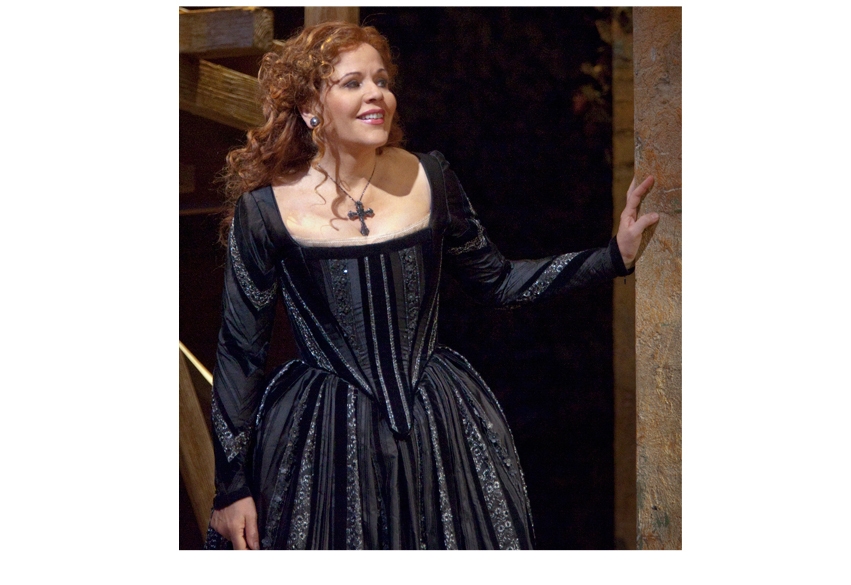Having seen and been most impressed by two New York Met relays of Wagner operas on the big screen, I was interested to see how the largely close-up medium would cope with a Handel opera, where the challenges are quite different. Both composers have single characters singing for large stretches of time, but, while Wagner’s are always involved in a process of feeling, so that there is a sense of exploration at every moment, Handel’s are immersed in states of feeling.
In da capo arias they often move from rage to resolution, or something of the kind, but then revert to the original state and its music, presumably to endow their arias with symmetry; though it has been suggested that Handel regards emotional states as inherently obsessional, so that the figures he portrays are all locked, for the length of an aria at least, in a feeling that they are unable to emerge from. That seems to me to be absurd, not so much as an account of the peculiar nature of Handel’s operas, as of the way people in fact feel, unless they are trapped or basking in a particular state, which is more the exception than the rule.
Anyway, for cinematic purposes it is tricky to have a singer in close-up endlessly repeating the same words, and tempting for the relay producers to let their cameras wander over the scenery, or to get the director — in this case Stephen Wadsworth — to encourage his singers to fidget. Neither occurred in this relay of Rodelinda, one of Handel’s greatest operas, though still, to my mind, caught in the limitations of the da capo form.
When Glyndebourne did it in the late 1990s, it was staged almost as a silent black-and-white movie with a soundtrack of genius. That worked mainly extremely well, and though there was a persistent element of campy humour in what is fundamentally a dark opera, that served to give a clever perspective on the apparently arbitrary vacillations of the characters.
The Met has a completely different approach. The scenery is so complicated that I lost sense of location. Rodelinda is set in Milan, but this one seemed to be in Spain, with sets that might serve equally well for Don Giovanni or Carmen. They move sideways, too, and by the end I felt I had been strolling in a town and had no idea where I’d got to. Not that one sees that much of the scenery — as so often, almost the whole opera is shot in close-up, and one is impressed by how expressive the singers manage to make their faces while reeling off kilometres of coloratura; but one does forfeit a sense of environment and context. This is an opera about politicians, and doesn’t shrink from showing how appalling they are. But this production makes it a matter of private passions, with a particular emphasis on the small son of Rodelinda and Bertarido, a silent role played so magnificently that the actor’s name should certainly have been on the cast list.
It is one of those Met productions where every singer is a star, and all of them were on top form. Renée Fleming, in the title role, no longer commands the creamy tones of a decade ago, in fact is rather edgy. That suits the character, and her acting was most moving, and purged of the archness and synthetic quality which I often used to find in it. Her thought-to-be-dead husband Bertarido was definitively portrayed by Andreas Scholl. He played the role at Glyndebourne, too, but he was a gauche actor then, while now he simply is the character, and his voice is more beautiful than ever. Bertarido’s Act I aria, in front of his own memorial, and his aria and duet with his wife at the end of Act II, were sublime, and could never be forgotten by anyone who saw and heard them. In the much smaller role of Unulfo, Bertarido’s loyal friend, Iestyn Davies was on the same level. They must be the two supreme counter-tenors in the world, and in the second intermission both were intelligently interviewed by Deborah Voigt.
The two villains, one prepared to stop at nothing and the other unable to shoot Rodelinda’s son in front of her, managed, just, not to lapse into self-parody as they hurled out their arias of lust, ambition and vengeance: Shenyang and Joseph Kaiser, fine tenors, have less great music to sing than their counter-parts, but kept the temperature up — no point denying that, as usual, in the expository Act I Handel’s inspiration takes some time to arrive, and then sometimes recedes. The formidable Stephanie Blythe rounded out the cast with a staggering account of the Amneris-like Eduige. In her interview with Voigt she claimed that the biggest challenge Handel sets his singers is how to vary their repetitions, and went on to say that that gives them an element of spontaneity. I couldn’t hear that.
The conductor, Harry Bicket, miraculously turned the Met orchestra into an intimate baroque ensemble, and any shortcomings were the composer’s.






Comments